Investigating Equality and Diversity Impact on JD Sports Performance
VerifiedAdded on 2023/01/10
|11
|2705
|43
Project
AI Summary
This research proposal investigates the impact of behaviors supporting equality and diversity on the performance of JD Sports Fashion plc. The study aims to evaluate the importance of these behaviors in the workplace, analyze their influence on organizational performance, and identify effective management techniques. The research will be conducted at a JD Sports store in London, employing a mixed-methods approach with a deductive research approach and quantitative data analysis using a survey method and questionnaires. The proposal includes a literature review, details the research approach and methodologies, and outlines the activities and timelines. Ethical considerations, including participant consent and data security, are addressed, ensuring compliance with relevant regulations. The research seeks to provide insights into how JD Sports can enhance its performance through improved equality and diversity practices.

Paraphrase This Document
Need a fresh take? Get an instant paraphrase of this document with our AI Paraphraser

Research Proposal Form
Student Name: _ Student ID: ____________
Centre Name:
Tutor: ________________ Date:
Unit: 11 Research Proposal
Proposed Title: Impact of Behaviour that support equality and diversity on
performance of an organisation
Student Name: _ Student ID: ____________
Centre Name:
Tutor: ________________ Date:
Unit: 11 Research Proposal
Proposed Title: Impact of Behaviour that support equality and diversity on
performance of an organisation
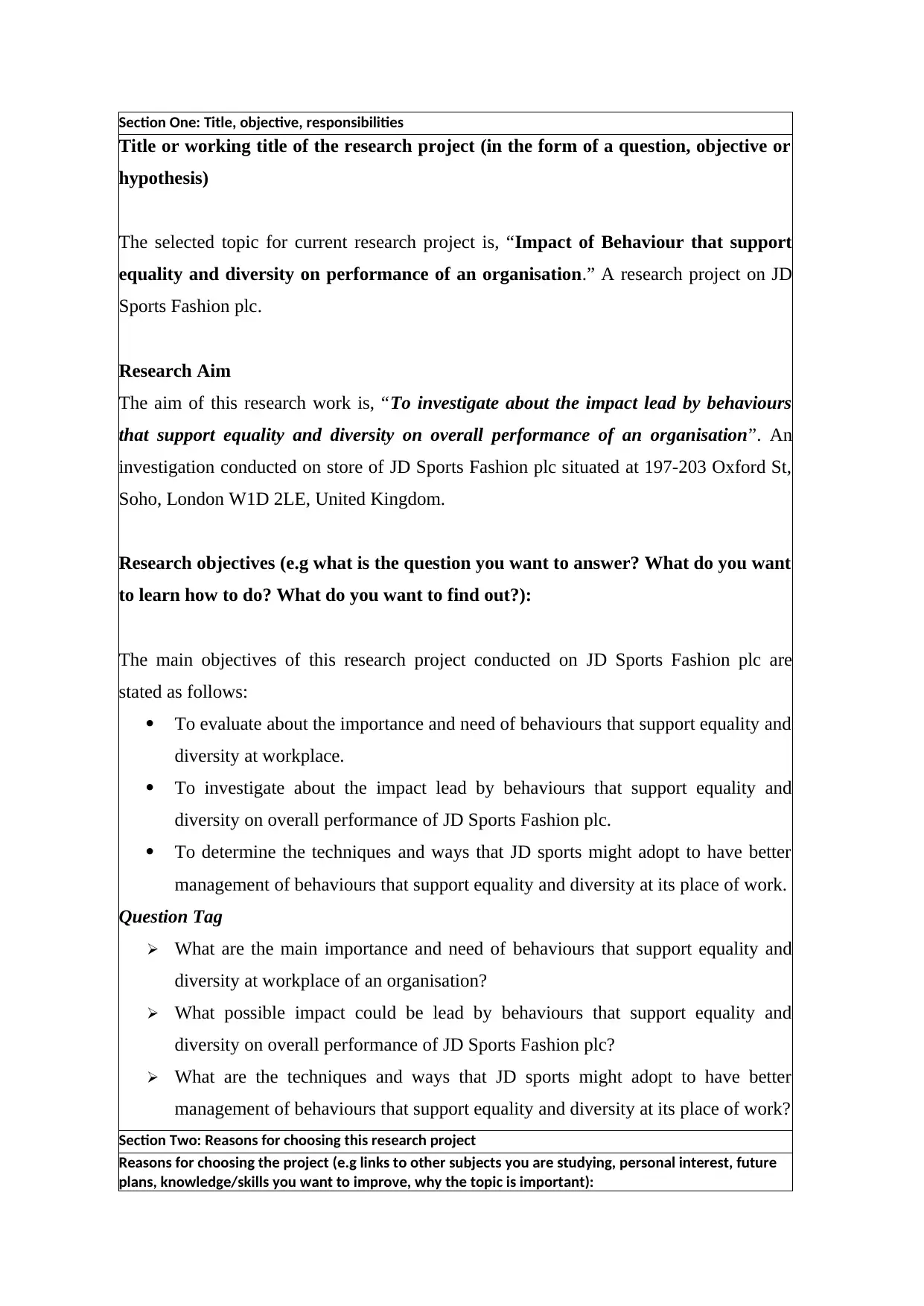
Section One: Title, objective, responsibilities
Title or working title of the research project (in the form of a question, objective or
hypothesis)
The selected topic for current research project is, “Impact of Behaviour that support
equality and diversity on performance of an organisation.” A research project on JD
Sports Fashion plc.
Research Aim
The aim of this research work is, “To investigate about the impact lead by behaviours
that support equality and diversity on overall performance of an organisation”. An
investigation conducted on store of JD Sports Fashion plc situated at 197-203 Oxford St,
Soho, London W1D 2LE, United Kingdom.
Research objectives (e.g what is the question you want to answer? What do you want
to learn how to do? What do you want to find out?):
The main objectives of this research project conducted on JD Sports Fashion plc are
stated as follows:
To evaluate about the importance and need of behaviours that support equality and
diversity at workplace.
To investigate about the impact lead by behaviours that support equality and
diversity on overall performance of JD Sports Fashion plc.
To determine the techniques and ways that JD sports might adopt to have better
management of behaviours that support equality and diversity at its place of work.
Question Tag
What are the main importance and need of behaviours that support equality and
diversity at workplace of an organisation?
What possible impact could be lead by behaviours that support equality and
diversity on overall performance of JD Sports Fashion plc?
What are the techniques and ways that JD sports might adopt to have better
management of behaviours that support equality and diversity at its place of work?
Section Two: Reasons for choosing this research project
Reasons for choosing the project (e.g links to other subjects you are studying, personal interest, future
plans, knowledge/skills you want to improve, why the topic is important):
Title or working title of the research project (in the form of a question, objective or
hypothesis)
The selected topic for current research project is, “Impact of Behaviour that support
equality and diversity on performance of an organisation.” A research project on JD
Sports Fashion plc.
Research Aim
The aim of this research work is, “To investigate about the impact lead by behaviours
that support equality and diversity on overall performance of an organisation”. An
investigation conducted on store of JD Sports Fashion plc situated at 197-203 Oxford St,
Soho, London W1D 2LE, United Kingdom.
Research objectives (e.g what is the question you want to answer? What do you want
to learn how to do? What do you want to find out?):
The main objectives of this research project conducted on JD Sports Fashion plc are
stated as follows:
To evaluate about the importance and need of behaviours that support equality and
diversity at workplace.
To investigate about the impact lead by behaviours that support equality and
diversity on overall performance of JD Sports Fashion plc.
To determine the techniques and ways that JD sports might adopt to have better
management of behaviours that support equality and diversity at its place of work.
Question Tag
What are the main importance and need of behaviours that support equality and
diversity at workplace of an organisation?
What possible impact could be lead by behaviours that support equality and
diversity on overall performance of JD Sports Fashion plc?
What are the techniques and ways that JD sports might adopt to have better
management of behaviours that support equality and diversity at its place of work?
Section Two: Reasons for choosing this research project
Reasons for choosing the project (e.g links to other subjects you are studying, personal interest, future
plans, knowledge/skills you want to improve, why the topic is important):
⊘ This is a preview!⊘
Do you want full access?
Subscribe today to unlock all pages.

Trusted by 1+ million students worldwide
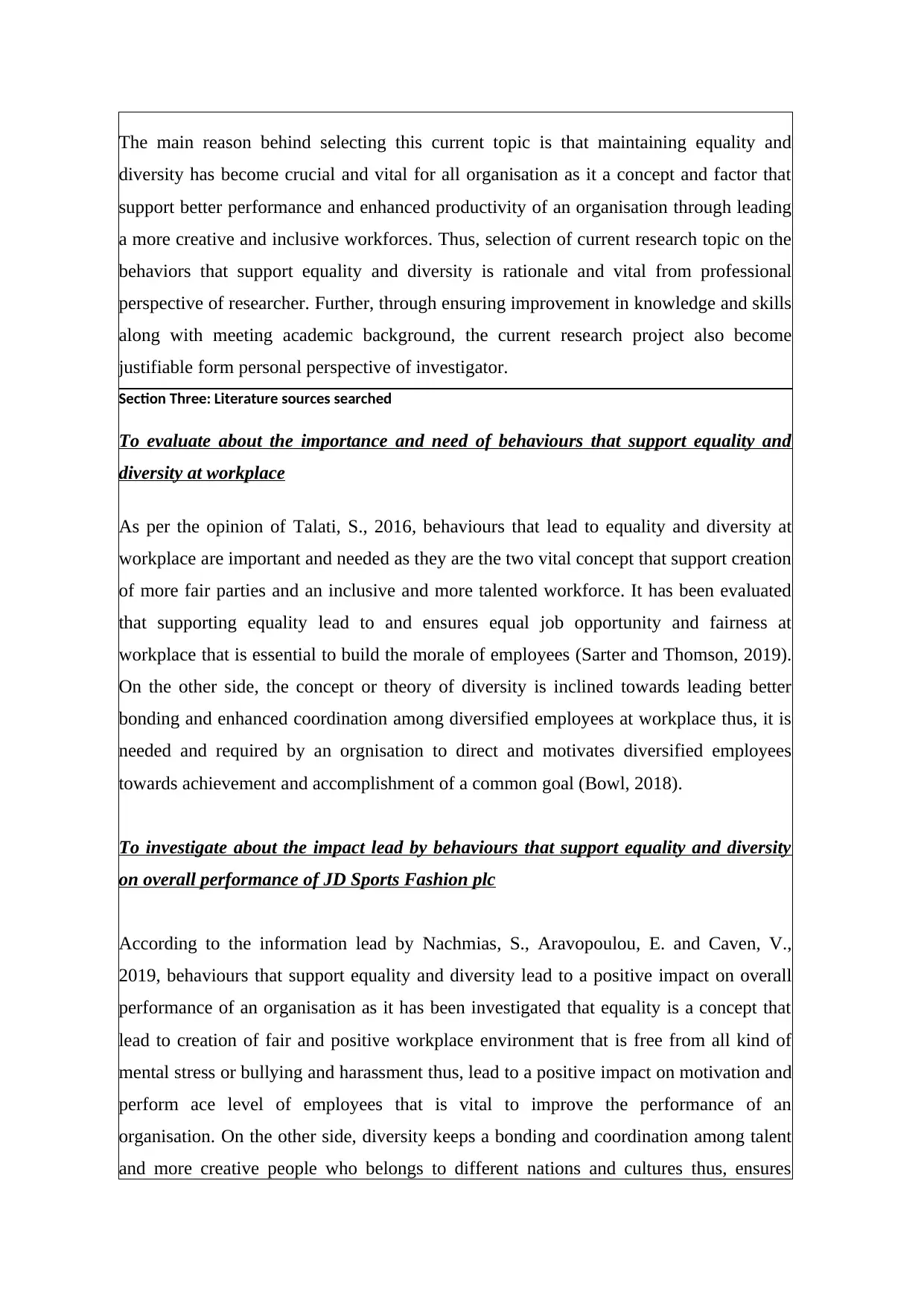
The main reason behind selecting this current topic is that maintaining equality and
diversity has become crucial and vital for all organisation as it a concept and factor that
support better performance and enhanced productivity of an organisation through leading
a more creative and inclusive workforces. Thus, selection of current research topic on the
behaviors that support equality and diversity is rationale and vital from professional
perspective of researcher. Further, through ensuring improvement in knowledge and skills
along with meeting academic background, the current research project also become
justifiable form personal perspective of investigator.
Section Three: Literature sources searched
To evaluate about the importance and need of behaviours that support equality and
diversity at workplace
As per the opinion of Talati, S., 2016, behaviours that lead to equality and diversity at
workplace are important and needed as they are the two vital concept that support creation
of more fair parties and an inclusive and more talented workforce. It has been evaluated
that supporting equality lead to and ensures equal job opportunity and fairness at
workplace that is essential to build the morale of employees (Sarter and Thomson, 2019).
On the other side, the concept or theory of diversity is inclined towards leading better
bonding and enhanced coordination among diversified employees at workplace thus, it is
needed and required by an orgnisation to direct and motivates diversified employees
towards achievement and accomplishment of a common goal (Bowl, 2018).
To investigate about the impact lead by behaviours that support equality and diversity
on overall performance of JD Sports Fashion plc
According to the information lead by Nachmias, S., Aravopoulou, E. and Caven, V.,
2019, behaviours that support equality and diversity lead to a positive impact on overall
performance of an organisation as it has been investigated that equality is a concept that
lead to creation of fair and positive workplace environment that is free from all kind of
mental stress or bullying and harassment thus, lead to a positive impact on motivation and
perform ace level of employees that is vital to improve the performance of an
organisation. On the other side, diversity keeps a bonding and coordination among talent
and more creative people who belongs to different nations and cultures thus, ensures
diversity has become crucial and vital for all organisation as it a concept and factor that
support better performance and enhanced productivity of an organisation through leading
a more creative and inclusive workforces. Thus, selection of current research topic on the
behaviors that support equality and diversity is rationale and vital from professional
perspective of researcher. Further, through ensuring improvement in knowledge and skills
along with meeting academic background, the current research project also become
justifiable form personal perspective of investigator.
Section Three: Literature sources searched
To evaluate about the importance and need of behaviours that support equality and
diversity at workplace
As per the opinion of Talati, S., 2016, behaviours that lead to equality and diversity at
workplace are important and needed as they are the two vital concept that support creation
of more fair parties and an inclusive and more talented workforce. It has been evaluated
that supporting equality lead to and ensures equal job opportunity and fairness at
workplace that is essential to build the morale of employees (Sarter and Thomson, 2019).
On the other side, the concept or theory of diversity is inclined towards leading better
bonding and enhanced coordination among diversified employees at workplace thus, it is
needed and required by an orgnisation to direct and motivates diversified employees
towards achievement and accomplishment of a common goal (Bowl, 2018).
To investigate about the impact lead by behaviours that support equality and diversity
on overall performance of JD Sports Fashion plc
According to the information lead by Nachmias, S., Aravopoulou, E. and Caven, V.,
2019, behaviours that support equality and diversity lead to a positive impact on overall
performance of an organisation as it has been investigated that equality is a concept that
lead to creation of fair and positive workplace environment that is free from all kind of
mental stress or bullying and harassment thus, lead to a positive impact on motivation and
perform ace level of employees that is vital to improve the performance of an
organisation. On the other side, diversity keeps a bonding and coordination among talent
and more creative people who belongs to different nations and cultures thus, ensures
Paraphrase This Document
Need a fresh take? Get an instant paraphrase of this document with our AI Paraphraser
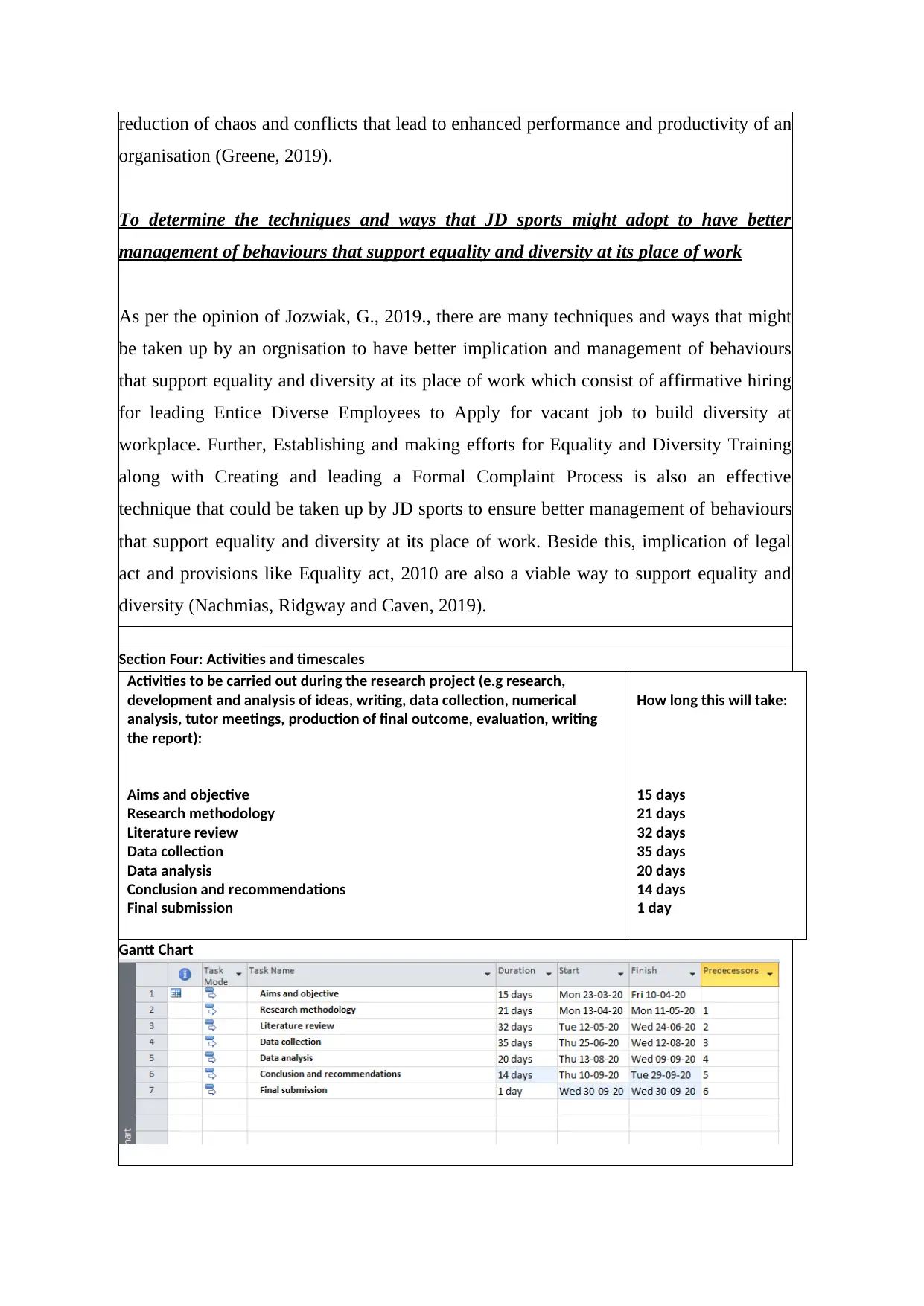
reduction of chaos and conflicts that lead to enhanced performance and productivity of an
organisation (Greene, 2019).
To determine the techniques and ways that JD sports might adopt to have better
management of behaviours that support equality and diversity at its place of work
As per the opinion of Jozwiak, G., 2019., there are many techniques and ways that might
be taken up by an orgnisation to have better implication and management of behaviours
that support equality and diversity at its place of work which consist of affirmative hiring
for leading Entice Diverse Employees to Apply for vacant job to build diversity at
workplace. Further, Establishing and making efforts for Equality and Diversity Training
along with Creating and leading a Formal Complaint Process is also an effective
technique that could be taken up by JD sports to ensure better management of behaviours
that support equality and diversity at its place of work. Beside this, implication of legal
act and provisions like Equality act, 2010 are also a viable way to support equality and
diversity (Nachmias, Ridgway and Caven, 2019).
Section Four: Activities and timescales
Activities to be carried out during the research project (e.g research,
development and analysis of ideas, writing, data collection, numerical
analysis, tutor meetings, production of final outcome, evaluation, writing
the report):
Aims and objective
Research methodology
Literature review
Data collection
Data analysis
Conclusion and recommendations
Final submission
How long this will take:
15 days
21 days
32 days
35 days
20 days
14 days
1 day
Gantt Chart
organisation (Greene, 2019).
To determine the techniques and ways that JD sports might adopt to have better
management of behaviours that support equality and diversity at its place of work
As per the opinion of Jozwiak, G., 2019., there are many techniques and ways that might
be taken up by an orgnisation to have better implication and management of behaviours
that support equality and diversity at its place of work which consist of affirmative hiring
for leading Entice Diverse Employees to Apply for vacant job to build diversity at
workplace. Further, Establishing and making efforts for Equality and Diversity Training
along with Creating and leading a Formal Complaint Process is also an effective
technique that could be taken up by JD sports to ensure better management of behaviours
that support equality and diversity at its place of work. Beside this, implication of legal
act and provisions like Equality act, 2010 are also a viable way to support equality and
diversity (Nachmias, Ridgway and Caven, 2019).
Section Four: Activities and timescales
Activities to be carried out during the research project (e.g research,
development and analysis of ideas, writing, data collection, numerical
analysis, tutor meetings, production of final outcome, evaluation, writing
the report):
Aims and objective
Research methodology
Literature review
Data collection
Data analysis
Conclusion and recommendations
Final submission
How long this will take:
15 days
21 days
32 days
35 days
20 days
14 days
1 day
Gantt Chart
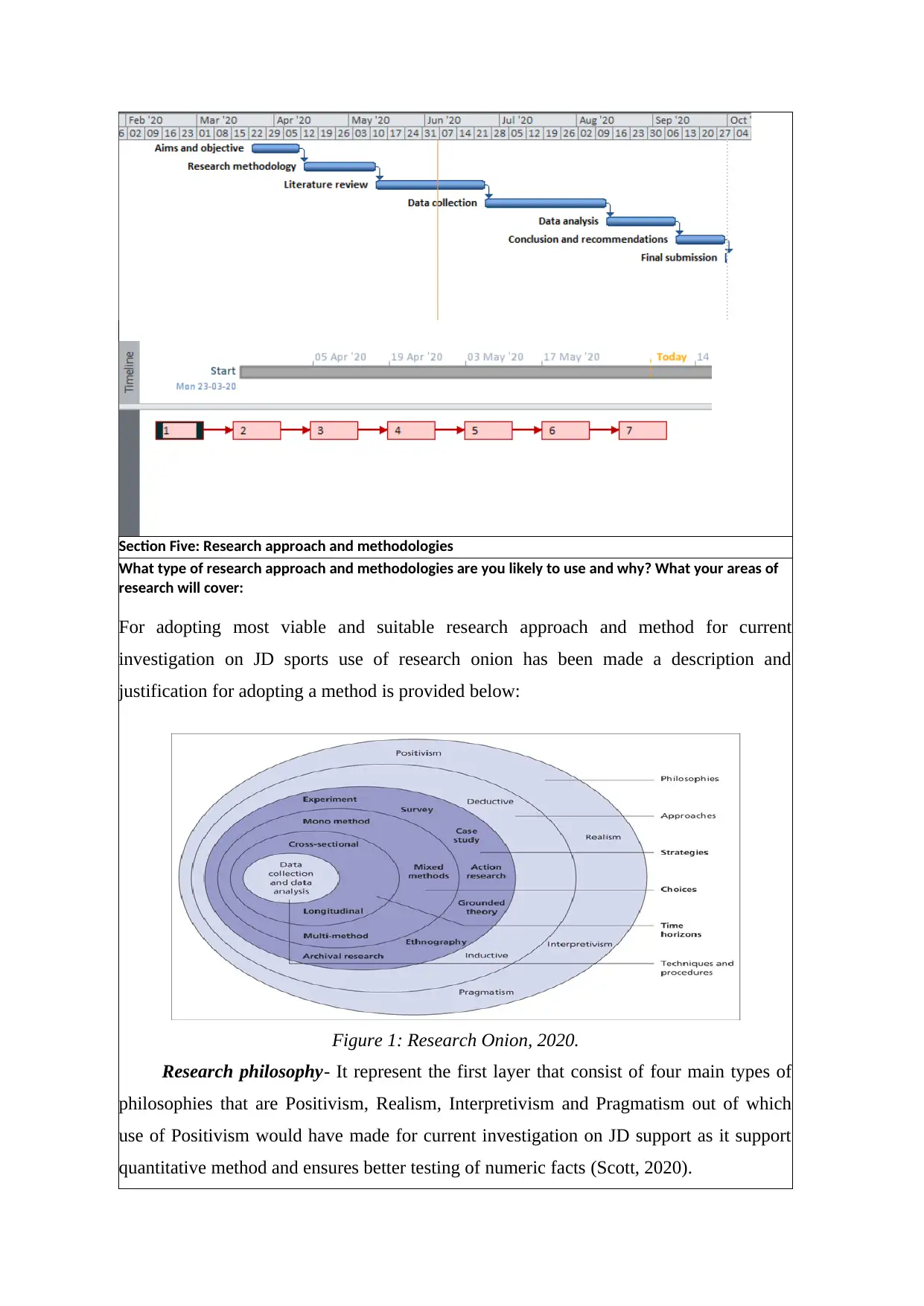
Section Five: Research approach and methodologies
What type of research approach and methodologies are you likely to use and why? What your areas of
research will cover:
For adopting most viable and suitable research approach and method for current
investigation on JD sports use of research onion has been made a description and
justification for adopting a method is provided below:
Figure 1: Research Onion, 2020.
Research philosophy- It represent the first layer that consist of four main types of
philosophies that are Positivism, Realism, Interpretivism and Pragmatism out of which
use of Positivism would have made for current investigation on JD support as it support
quantitative method and ensures better testing of numeric facts (Scott, 2020).
What type of research approach and methodologies are you likely to use and why? What your areas of
research will cover:
For adopting most viable and suitable research approach and method for current
investigation on JD sports use of research onion has been made a description and
justification for adopting a method is provided below:
Figure 1: Research Onion, 2020.
Research philosophy- It represent the first layer that consist of four main types of
philosophies that are Positivism, Realism, Interpretivism and Pragmatism out of which
use of Positivism would have made for current investigation on JD support as it support
quantitative method and ensures better testing of numeric facts (Scott, 2020).
⊘ This is a preview!⊘
Do you want full access?
Subscribe today to unlock all pages.

Trusted by 1+ million students worldwide
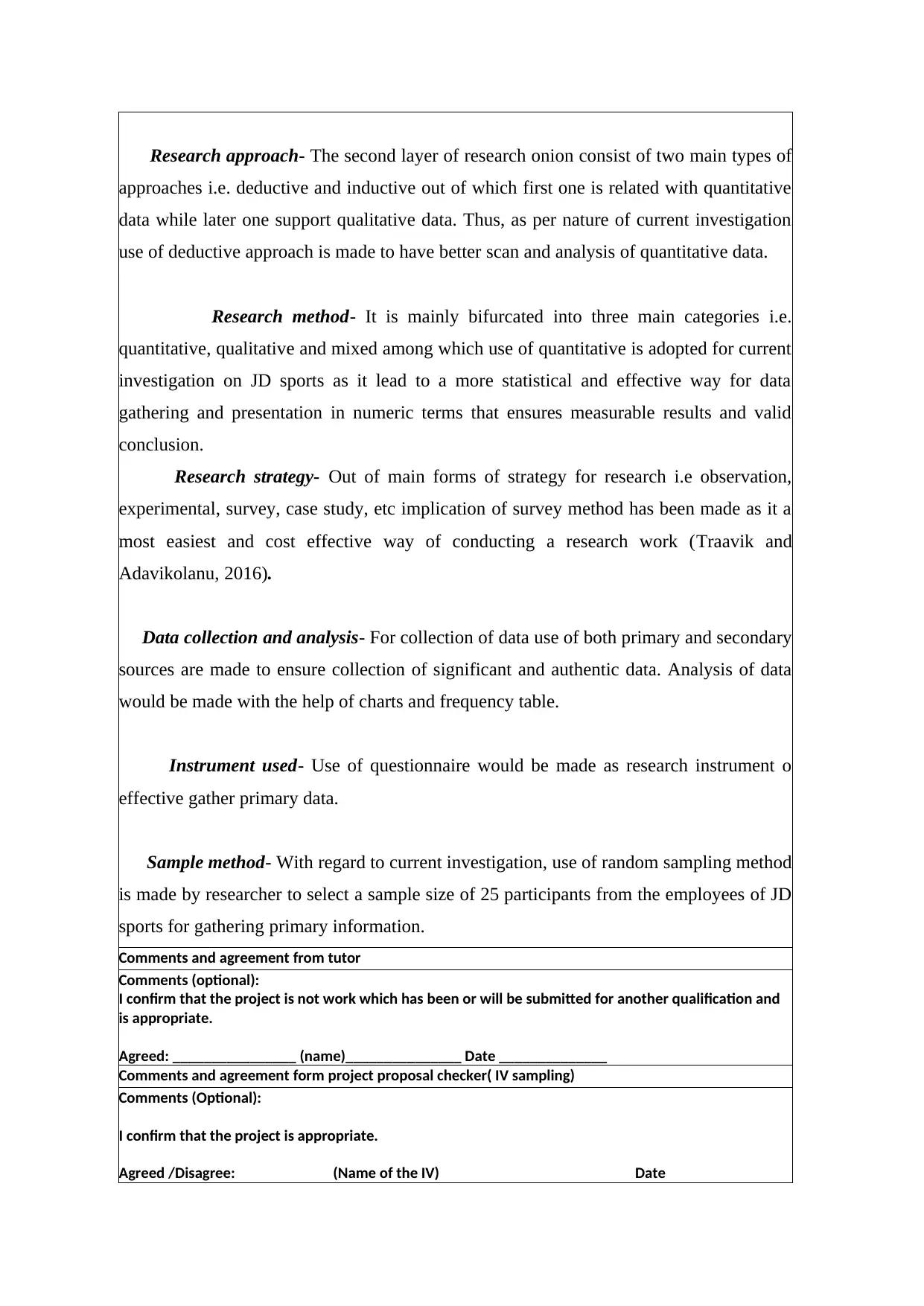
Research approach- The second layer of research onion consist of two main types of
approaches i.e. deductive and inductive out of which first one is related with quantitative
data while later one support qualitative data. Thus, as per nature of current investigation
use of deductive approach is made to have better scan and analysis of quantitative data.
Research method- It is mainly bifurcated into three main categories i.e.
quantitative, qualitative and mixed among which use of quantitative is adopted for current
investigation on JD sports as it lead to a more statistical and effective way for data
gathering and presentation in numeric terms that ensures measurable results and valid
conclusion.
Research strategy- Out of main forms of strategy for research i.e observation,
experimental, survey, case study, etc implication of survey method has been made as it a
most easiest and cost effective way of conducting a research work (Traavik and
Adavikolanu, 2016).
Data collection and analysis- For collection of data use of both primary and secondary
sources are made to ensure collection of significant and authentic data. Analysis of data
would be made with the help of charts and frequency table.
Instrument used- Use of questionnaire would be made as research instrument o
effective gather primary data.
Sample method- With regard to current investigation, use of random sampling method
is made by researcher to select a sample size of 25 participants from the employees of JD
sports for gathering primary information.
Comments and agreement from tutor
Comments (optional):
I confirm that the project is not work which has been or will be submitted for another qualification and
is appropriate.
Agreed: ________________ (name)_______________ Date ______________
Comments and agreement form project proposal checker( IV sampling)
Comments (Optional):
I confirm that the project is appropriate.
Agreed /Disagree: (Name of the IV) Date
approaches i.e. deductive and inductive out of which first one is related with quantitative
data while later one support qualitative data. Thus, as per nature of current investigation
use of deductive approach is made to have better scan and analysis of quantitative data.
Research method- It is mainly bifurcated into three main categories i.e.
quantitative, qualitative and mixed among which use of quantitative is adopted for current
investigation on JD sports as it lead to a more statistical and effective way for data
gathering and presentation in numeric terms that ensures measurable results and valid
conclusion.
Research strategy- Out of main forms of strategy for research i.e observation,
experimental, survey, case study, etc implication of survey method has been made as it a
most easiest and cost effective way of conducting a research work (Traavik and
Adavikolanu, 2016).
Data collection and analysis- For collection of data use of both primary and secondary
sources are made to ensure collection of significant and authentic data. Analysis of data
would be made with the help of charts and frequency table.
Instrument used- Use of questionnaire would be made as research instrument o
effective gather primary data.
Sample method- With regard to current investigation, use of random sampling method
is made by researcher to select a sample size of 25 participants from the employees of JD
sports for gathering primary information.
Comments and agreement from tutor
Comments (optional):
I confirm that the project is not work which has been or will be submitted for another qualification and
is appropriate.
Agreed: ________________ (name)_______________ Date ______________
Comments and agreement form project proposal checker( IV sampling)
Comments (Optional):
I confirm that the project is appropriate.
Agreed /Disagree: (Name of the IV) Date
Paraphrase This Document
Need a fresh take? Get an instant paraphrase of this document with our AI Paraphraser

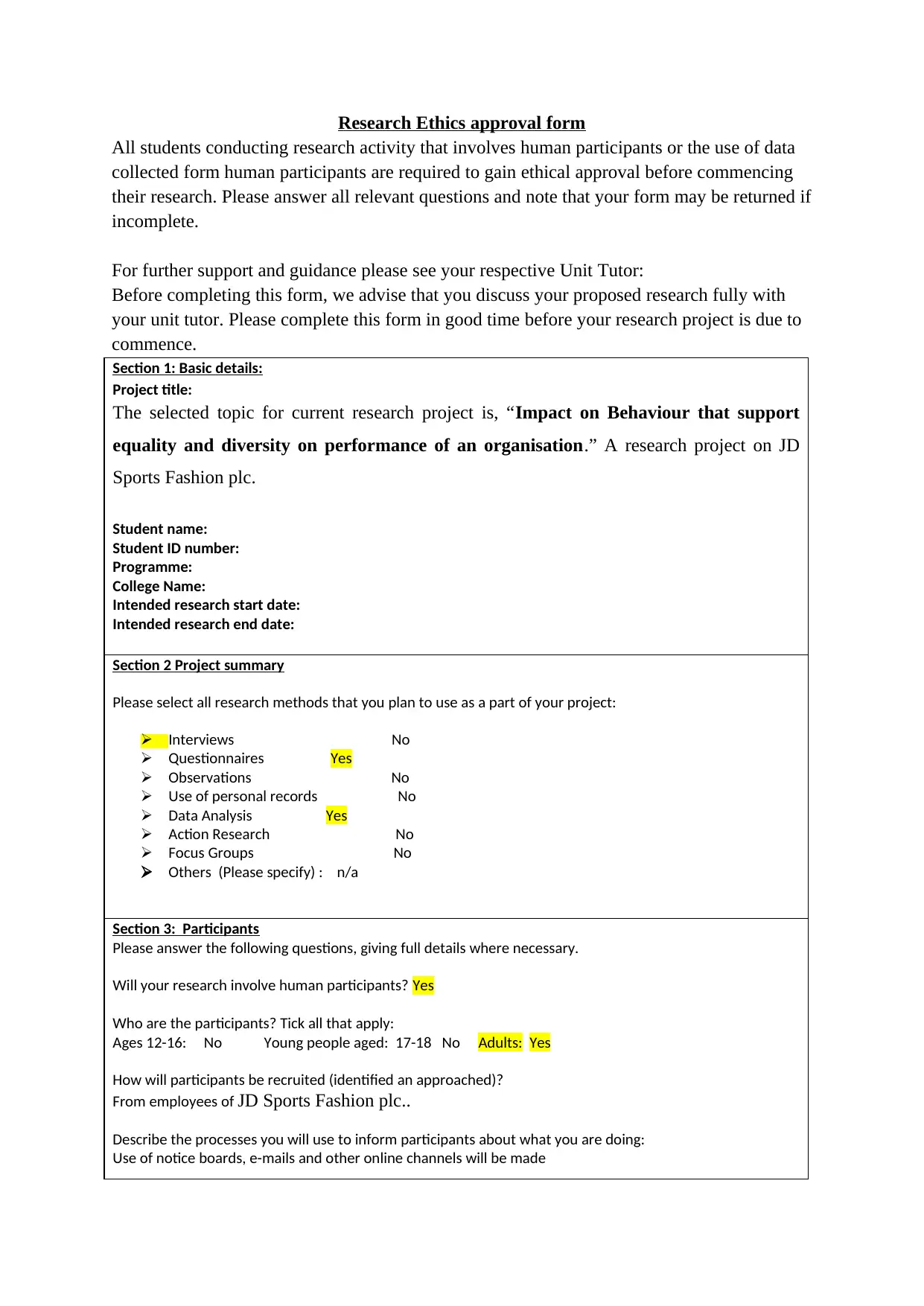
Research Ethics approval form
All students conducting research activity that involves human participants or the use of data
collected form human participants are required to gain ethical approval before commencing
their research. Please answer all relevant questions and note that your form may be returned if
incomplete.
For further support and guidance please see your respective Unit Tutor:
Before completing this form, we advise that you discuss your proposed research fully with
your unit tutor. Please complete this form in good time before your research project is due to
commence.
Section 1: Basic details:
Project title:
The selected topic for current research project is, “Impact on Behaviour that support
equality and diversity on performance of an organisation.” A research project on JD
Sports Fashion plc.
Student name:
Student ID number:
Programme:
College Name:
Intended research start date:
Intended research end date:
Section 2 Project summary
Please select all research methods that you plan to use as a part of your project:
Interviews No
Questionnaires Yes
Observations No
Use of personal records No
Data Analysis Yes
Action Research No
Focus Groups No
Others (Please specify) : n/a
Section 3: Participants
Please answer the following questions, giving full details where necessary.
Will your research involve human participants? Yes
Who are the participants? Tick all that apply:
Ages 12-16: No Young people aged: 17-18 No Adults: Yes
How will participants be recruited (identified an approached)?
From employees of JD Sports Fashion plc..
Describe the processes you will use to inform participants about what you are doing:
Use of notice boards, e-mails and other online channels will be made
All students conducting research activity that involves human participants or the use of data
collected form human participants are required to gain ethical approval before commencing
their research. Please answer all relevant questions and note that your form may be returned if
incomplete.
For further support and guidance please see your respective Unit Tutor:
Before completing this form, we advise that you discuss your proposed research fully with
your unit tutor. Please complete this form in good time before your research project is due to
commence.
Section 1: Basic details:
Project title:
The selected topic for current research project is, “Impact on Behaviour that support
equality and diversity on performance of an organisation.” A research project on JD
Sports Fashion plc.
Student name:
Student ID number:
Programme:
College Name:
Intended research start date:
Intended research end date:
Section 2 Project summary
Please select all research methods that you plan to use as a part of your project:
Interviews No
Questionnaires Yes
Observations No
Use of personal records No
Data Analysis Yes
Action Research No
Focus Groups No
Others (Please specify) : n/a
Section 3: Participants
Please answer the following questions, giving full details where necessary.
Will your research involve human participants? Yes
Who are the participants? Tick all that apply:
Ages 12-16: No Young people aged: 17-18 No Adults: Yes
How will participants be recruited (identified an approached)?
From employees of JD Sports Fashion plc..
Describe the processes you will use to inform participants about what you are doing:
Use of notice boards, e-mails and other online channels will be made
⊘ This is a preview!⊘
Do you want full access?
Subscribe today to unlock all pages.

Trusted by 1+ million students worldwide
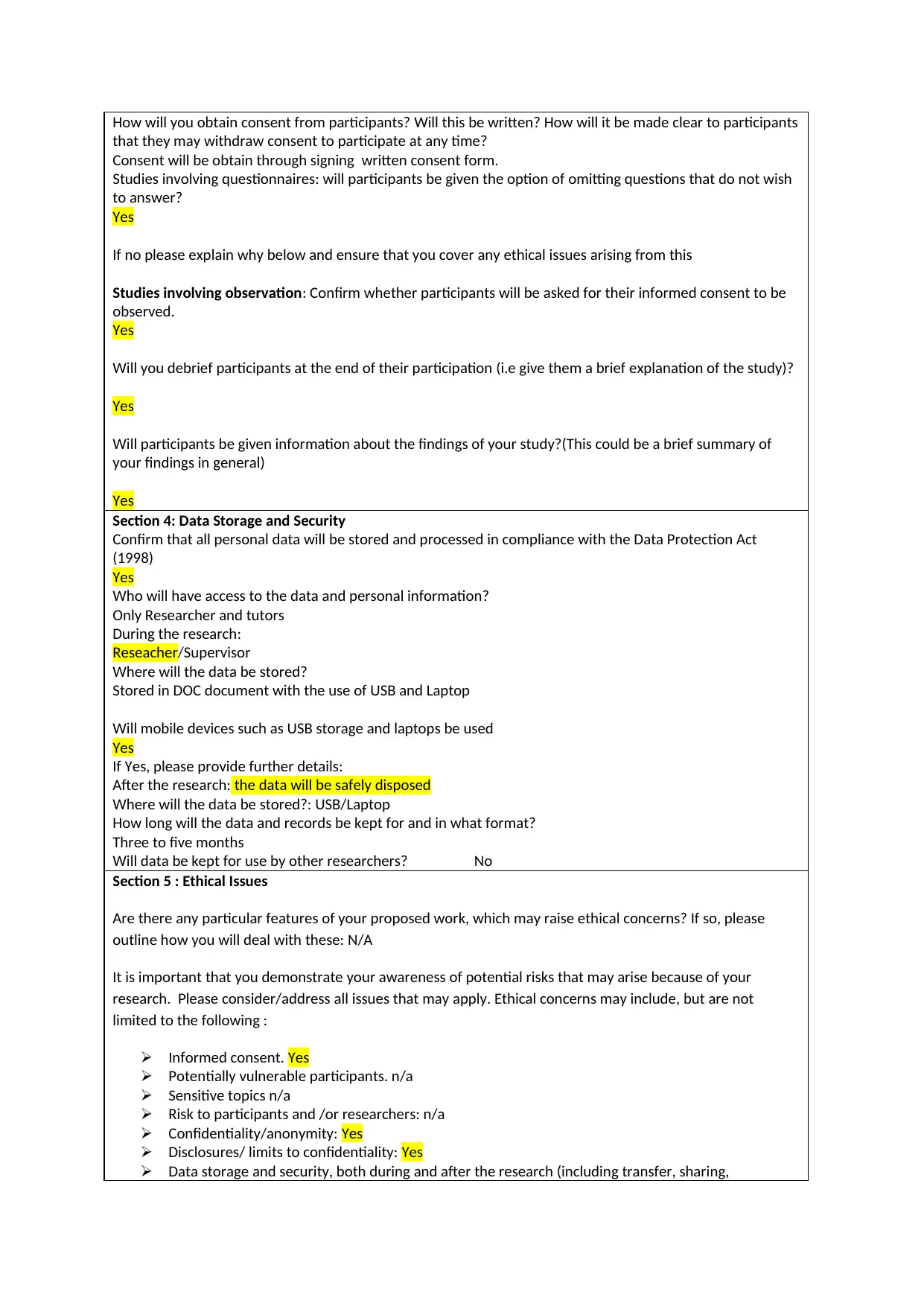
How will you obtain consent from participants? Will this be written? How will it be made clear to participants
that they may withdraw consent to participate at any time?
Consent will be obtain through signing written consent form.
Studies involving questionnaires: will participants be given the option of omitting questions that do not wish
to answer?
Yes
If no please explain why below and ensure that you cover any ethical issues arising from this
Studies involving observation: Confirm whether participants will be asked for their informed consent to be
observed.
Yes
Will you debrief participants at the end of their participation (i.e give them a brief explanation of the study)?
Yes
Will participants be given information about the findings of your study?(This could be a brief summary of
your findings in general)
Yes
Section 4: Data Storage and Security
Confirm that all personal data will be stored and processed in compliance with the Data Protection Act
(1998)
Yes
Who will have access to the data and personal information?
Only Researcher and tutors
During the research:
Reseacher/Supervisor
Where will the data be stored?
Stored in DOC document with the use of USB and Laptop
Will mobile devices such as USB storage and laptops be used
Yes
If Yes, please provide further details:
After the research: the data will be safely disposed
Where will the data be stored?: USB/Laptop
How long will the data and records be kept for and in what format?
Three to five months
Will data be kept for use by other researchers? No
Section 5 : Ethical Issues
Are there any particular features of your proposed work, which may raise ethical concerns? If so, please
outline how you will deal with these: N/A
It is important that you demonstrate your awareness of potential risks that may arise because of your
research. Please consider/address all issues that may apply. Ethical concerns may include, but are not
limited to the following :
Informed consent. Yes
Potentially vulnerable participants. n/a
Sensitive topics n/a
Risk to participants and /or researchers: n/a
Confidentiality/anonymity: Yes
Disclosures/ limits to confidentiality: Yes
Data storage and security, both during and after the research (including transfer, sharing,
that they may withdraw consent to participate at any time?
Consent will be obtain through signing written consent form.
Studies involving questionnaires: will participants be given the option of omitting questions that do not wish
to answer?
Yes
If no please explain why below and ensure that you cover any ethical issues arising from this
Studies involving observation: Confirm whether participants will be asked for their informed consent to be
observed.
Yes
Will you debrief participants at the end of their participation (i.e give them a brief explanation of the study)?
Yes
Will participants be given information about the findings of your study?(This could be a brief summary of
your findings in general)
Yes
Section 4: Data Storage and Security
Confirm that all personal data will be stored and processed in compliance with the Data Protection Act
(1998)
Yes
Who will have access to the data and personal information?
Only Researcher and tutors
During the research:
Reseacher/Supervisor
Where will the data be stored?
Stored in DOC document with the use of USB and Laptop
Will mobile devices such as USB storage and laptops be used
Yes
If Yes, please provide further details:
After the research: the data will be safely disposed
Where will the data be stored?: USB/Laptop
How long will the data and records be kept for and in what format?
Three to five months
Will data be kept for use by other researchers? No
Section 5 : Ethical Issues
Are there any particular features of your proposed work, which may raise ethical concerns? If so, please
outline how you will deal with these: N/A
It is important that you demonstrate your awareness of potential risks that may arise because of your
research. Please consider/address all issues that may apply. Ethical concerns may include, but are not
limited to the following :
Informed consent. Yes
Potentially vulnerable participants. n/a
Sensitive topics n/a
Risk to participants and /or researchers: n/a
Confidentiality/anonymity: Yes
Disclosures/ limits to confidentiality: Yes
Data storage and security, both during and after the research (including transfer, sharing,
Paraphrase This Document
Need a fresh take? Get an instant paraphrase of this document with our AI Paraphraser
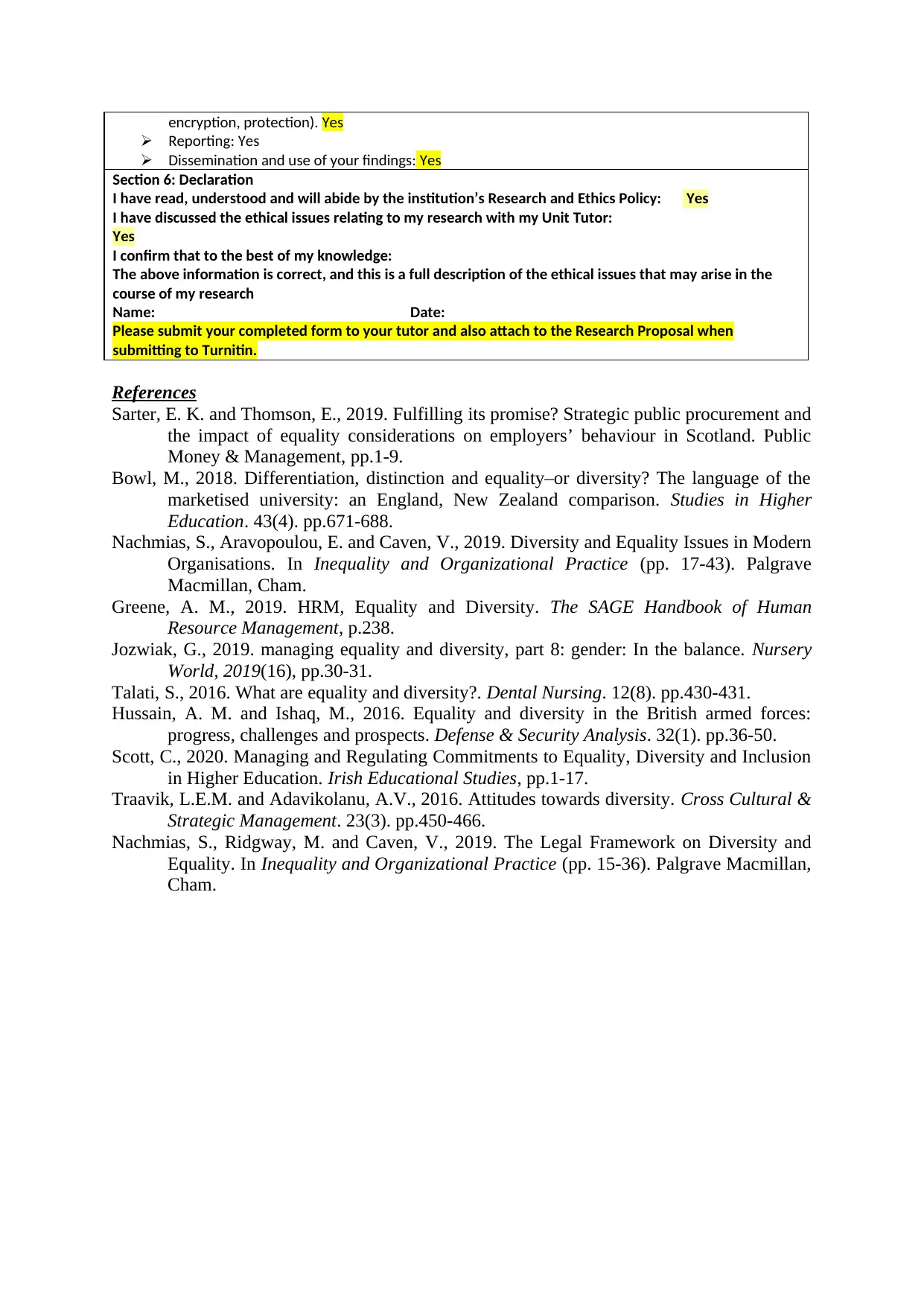
encryption, protection). Yes
Reporting: Yes
Dissemination and use of your findings: Yes
Section 6: Declaration
I have read, understood and will abide by the institution’s Research and Ethics Policy: Yes
I have discussed the ethical issues relating to my research with my Unit Tutor:
Yes
I confirm that to the best of my knowledge:
The above information is correct, and this is a full description of the ethical issues that may arise in the
course of my research
Name: Date:
Please submit your completed form to your tutor and also attach to the Research Proposal when
submitting to Turnitin.
References
Sarter, E. K. and Thomson, E., 2019. Fulfilling its promise? Strategic public procurement and
the impact of equality considerations on employers’ behaviour in Scotland. Public
Money & Management, pp.1-9.
Bowl, M., 2018. Differentiation, distinction and equality–or diversity? The language of the
marketised university: an England, New Zealand comparison. Studies in Higher
Education. 43(4). pp.671-688.
Nachmias, S., Aravopoulou, E. and Caven, V., 2019. Diversity and Equality Issues in Modern
Organisations. In Inequality and Organizational Practice (pp. 17-43). Palgrave
Macmillan, Cham.
Greene, A. M., 2019. HRM, Equality and Diversity. The SAGE Handbook of Human
Resource Management, p.238.
Jozwiak, G., 2019. managing equality and diversity, part 8: gender: In the balance. Nursery
World, 2019(16), pp.30-31.
Talati, S., 2016. What are equality and diversity?. Dental Nursing. 12(8). pp.430-431.
Hussain, A. M. and Ishaq, M., 2016. Equality and diversity in the British armed forces:
progress, challenges and prospects. Defense & Security Analysis. 32(1). pp.36-50.
Scott, C., 2020. Managing and Regulating Commitments to Equality, Diversity and Inclusion
in Higher Education. Irish Educational Studies, pp.1-17.
Traavik, L.E.M. and Adavikolanu, A.V., 2016. Attitudes towards diversity. Cross Cultural &
Strategic Management. 23(3). pp.450-466.
Nachmias, S., Ridgway, M. and Caven, V., 2019. The Legal Framework on Diversity and
Equality. In Inequality and Organizational Practice (pp. 15-36). Palgrave Macmillan,
Cham.
Reporting: Yes
Dissemination and use of your findings: Yes
Section 6: Declaration
I have read, understood and will abide by the institution’s Research and Ethics Policy: Yes
I have discussed the ethical issues relating to my research with my Unit Tutor:
Yes
I confirm that to the best of my knowledge:
The above information is correct, and this is a full description of the ethical issues that may arise in the
course of my research
Name: Date:
Please submit your completed form to your tutor and also attach to the Research Proposal when
submitting to Turnitin.
References
Sarter, E. K. and Thomson, E., 2019. Fulfilling its promise? Strategic public procurement and
the impact of equality considerations on employers’ behaviour in Scotland. Public
Money & Management, pp.1-9.
Bowl, M., 2018. Differentiation, distinction and equality–or diversity? The language of the
marketised university: an England, New Zealand comparison. Studies in Higher
Education. 43(4). pp.671-688.
Nachmias, S., Aravopoulou, E. and Caven, V., 2019. Diversity and Equality Issues in Modern
Organisations. In Inequality and Organizational Practice (pp. 17-43). Palgrave
Macmillan, Cham.
Greene, A. M., 2019. HRM, Equality and Diversity. The SAGE Handbook of Human
Resource Management, p.238.
Jozwiak, G., 2019. managing equality and diversity, part 8: gender: In the balance. Nursery
World, 2019(16), pp.30-31.
Talati, S., 2016. What are equality and diversity?. Dental Nursing. 12(8). pp.430-431.
Hussain, A. M. and Ishaq, M., 2016. Equality and diversity in the British armed forces:
progress, challenges and prospects. Defense & Security Analysis. 32(1). pp.36-50.
Scott, C., 2020. Managing and Regulating Commitments to Equality, Diversity and Inclusion
in Higher Education. Irish Educational Studies, pp.1-17.
Traavik, L.E.M. and Adavikolanu, A.V., 2016. Attitudes towards diversity. Cross Cultural &
Strategic Management. 23(3). pp.450-466.
Nachmias, S., Ridgway, M. and Caven, V., 2019. The Legal Framework on Diversity and
Equality. In Inequality and Organizational Practice (pp. 15-36). Palgrave Macmillan,
Cham.
1 out of 11
Related Documents
Your All-in-One AI-Powered Toolkit for Academic Success.
+13062052269
info@desklib.com
Available 24*7 on WhatsApp / Email
![[object Object]](/_next/static/media/star-bottom.7253800d.svg)
Unlock your academic potential
Copyright © 2020–2025 A2Z Services. All Rights Reserved. Developed and managed by ZUCOL.





